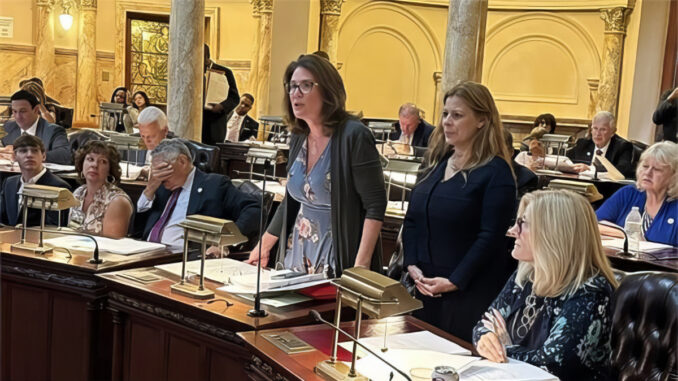
TRENTON—Senator Holly Schepisi introduced legislation, “Max’s Law,” on Feb. 22 that would require school districts provide instruction on the dangers of fentanyl and xylazine.
“This legislation is an important step in the fight against the epidemic of Fentanyl poisoning in New Jersey. I am honored to introduce Max’s Law in memory of Max Lenowitz of Woodcliff Lake, a beloved son, brother, and friend, and the thousands of other New Jersey residents who have lost their lives to fentanyl or xylazine poisoning,” said Schepisi (R-River Vale in a statement shared with Pascack Press).
(See “The agony of losing a child” and “A mom warns on fentanyl,” Pascack Press, July 23 and 17, 2023, respectively.)
She said, “Far too many young Americans, like Max, have had their lives cut short due to Fentanyl poisoning. I hope the Legislature will approve this legislation so that we can remember the victims of this lethal drug and work towards preventing future deaths from occurring.”
Max’s Law would require school districts to provide instruction on the dangers of fentanyl and xylazine, commonly referred to as “tranq,” as part of the district’s implementation of the New Jersey Student Learning Standards in Comprehensive Health and Physical Education.
Patrice Lenowitz, Max’s mother and a Woodcliff Lake resident, expressed her support for the bill and hopes that it will deliver the education necessary to keep children informed and alive.
“Talking to our children openly about the dangers they will be challenged with every day and working with them towards prevention is the first step towards keeping them safe. When parents and educators are aware, our children are prepared,” said Lenowitz. She added, “My family didn’t know much about Fentanyl, nor did we know counterfeit prescription pills containing fentanyl were so easily acquired and shared among their peers. Fentanyl and the new street drug, Xylazine, are highly addictive and deadly. One pill killed our son. Max’s Law delivers lifesaving education in the classroom to keep children and families informed and alive.”
Schepisi’s office says she has been a consistent advocate for legislation that would raise awareness about the dangers of fentanyl. Last year, Gov. Phil Murphy signed Schepisi’s joint resolution, SJR-128, into law. The bill designates July 14 as “Fentanyl Poisoning Awareness Day,” in honor of Max Lenowitz’s birthday.
The resolution notes Max was a star lacrosse player at Pascack Hills High School and he was awarded a Senate and General Assembly commendation and praise citation for his athletic achievements in 2014. Nicknamed “Leno” by his teammates, Max was described as the most authentic and sincere sibling and friend one could have.
Schepisi also sponsors S-2555, which would regulate residential mental health treatment facilities and streamline the process for individuals seeking treatment. This bill is part of Schepisi’s longstanding effort to make addiction and mental health services more accessible to New Jerseyans.
New Jersey is one of a few states in the nation to consider mandating instruction on the dangers of fentanyl and xylazine. Several states have already implemented laws, including: California, Illinois, Mississippi, Oregon, and Texas. A similar measure was approved by the House in Washington state.
Under “Max’s Law,” school instruction should include information on:
- Fentanyl and xylazine abuse prevention;
- Fentanyl and xylazine poisoning awareness;
- The dangers of synthetic opioids, including fentanyl or any substituted derivative of fentanyl, xylazine, and counterfeit drugs;
- Recognizing the symptoms of fentanyl and xylazine poisoning;
- How to respond to a fentanyl or xylazine poisoning emergency; and
- Laws that provide immunity or other protections for persons who report drug or alcohol use, or who seek medical treatment for drug or alcohol poisoning or overdoses for themselves or others.
